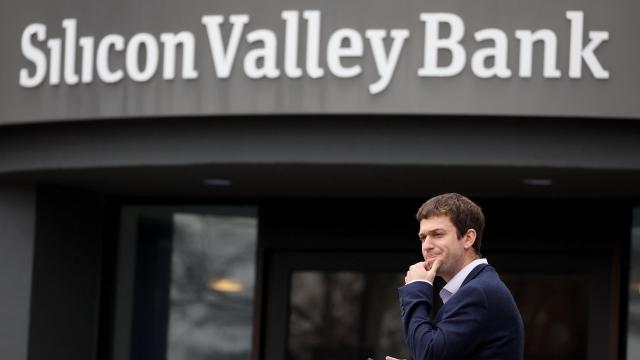Silicon Valley Bank, once triumphantly dubbed the “financial partner of the innovation economy,” before its recent historic collapse, is being acquired by First Citizens, a legacy banking institution founded in 1898. The new deal will see First Citizens take on the entirety of SVB’s loans and deposits just two weeks after the bank sent shockwaves through the financial industry with its sudden implosion.
First Citizen announced the deal on Monday in partnership with the Federal Deposit Insurance Corporation (FDIC), which previously seized SVB’s assets. The new acquisition will see First Citizens pick up $US72 ($100) billion of SVB’s loans at a discount of $US16.5 ($23) billion as well as $US56 ($78) billion in deposits. $US90 ($125) billion worth of securities and other assets will “remain in the receivership,” of the FDIC.
Starting on March 27, all of SVB’s 17 legacy physical branches will reportedly begin operating as a division of First Citizen Bank. First Citizens said the deal is the result of a weeks-long competitive bidding process between multiple institutions.
“SVB has a deep history of serving some of the most innovative companies in the world” First Citizens CEO and Chairman Frank B. Holding, Jr said during an investor call Monday morning. “SVB’s presence in California accelerates our growth in California”
First Citizen says the acquisition means former SVB customers will be able to continue accessing their accounts the same way they did before, which means they can still use their previous check cards and take out money from the same assortment of websites, mobile apps, and branch locations. First Citizen says it has also entered into a loss-share agreement with the FDIC which will see both entities share in possible losses on loans in the transaction. That agreement, according to First Citizens, should “provide further downside protection against potential credit losses.”
“The loss–share transaction is projected to maximise recoveries on the assets by keeping them in the private sector,” the FDIC said in a statement. “The transaction is also expected to minimise disruptions for loan customers.”
SVB rises from the dead
U.S. regulators moved to swiftly shut down Silicon Valley’s biggest bank earlier this month following a dramatic run on the banks. Prior to its failure, the second largest of any bank in U.S. history, SVB was the preferred bank for the tech sector and reportedly served nearly half of all venture capital-backed startups in the country. If left unchecked, regulators believed SVB’s sudden collapse could pose a systemic risk to the entire financial sector. U.S. financial regulators quickly extended a guarantee to cover all deposits at the bank and promised to make customers whole. Regulators initially transferred all SVB deposits and assets into a new “bridge” bank called Silicon Valley Bridge Bank as they searched for a new buyer.
“This transaction leverages our solid foundation to add significant scale, geographic diversity, compelling digital capabilities and most importantly, meaningful solutions for customers throughout their lifecycle,” Holding, Jr. added. “Specifically, we are committed to building on and preserving the strong relationships that legacy SVB’s Global Fund Banking business has with private equity and venture capital firms.”
This article is part of a developing story. Our writers and editors will be updating this page as new information is released. Please check back again in a few minutes to see the latest updates. Meanwhile, if you want more news coverage, check out our tech, science, or io9 front pages. And you can always see the most recent Gizmodo news stories at gizmodo.com/latest.
